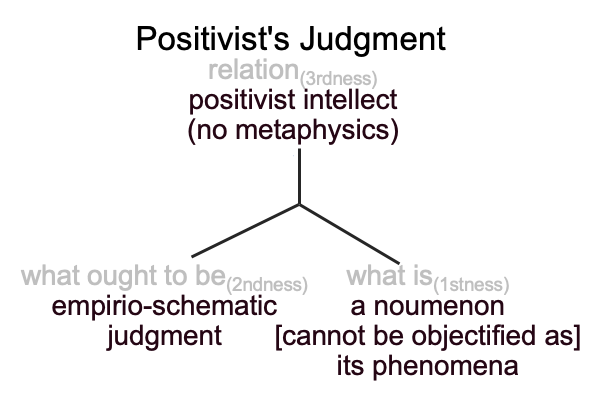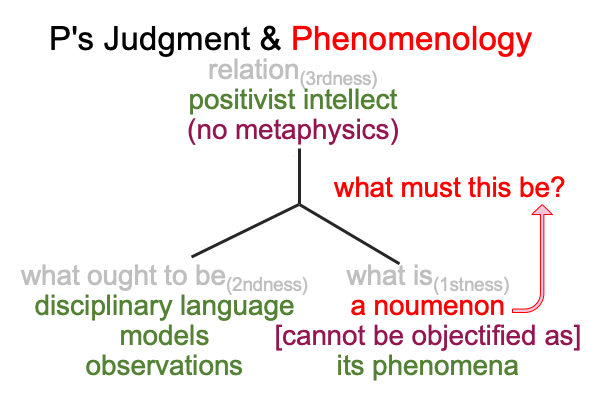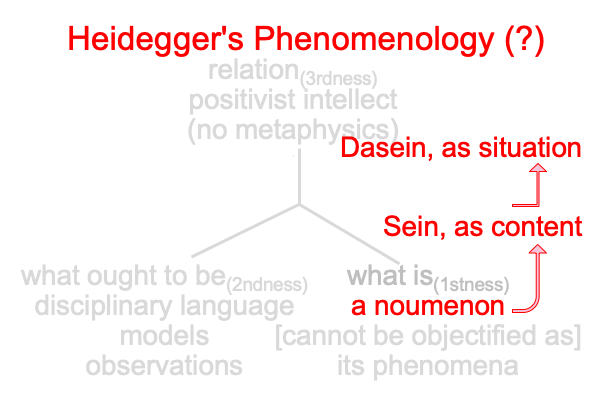0112 Does a correct interpretation of the West entail an alternate vision of science?
There are many ways to describe science. Who would describe science as two intertwined actionable judgments, that unfold into nested forms on the basis of their categorical assignments?
Razie Mah would.
0113 Even stranger, Razie Mah presents a series of commentaries, titled Phenomenology and the Positivist Intellect. Several works appear in that series, including Comments on Jack Reynold’s Book (2018) “Phenomenology, Naturalism and Science”, A Reverie on Mark Spencer’s Essay (2021) “The Many Phenomenological Reductions”, Comments on Joseph Trabbic’s Essay (2021) “Jean-Luc Marion and… First Philosophy” and Comments on Richard Colledge’s Essay (2021) “Thomism and Contemporary Phenomenological Reduction”. These are promoted in blogs at www.raziemah.com during September and October, 2021, as well as during March and April, 2022.
0114 What is there in the Positivist’s judgment that a phenomenologist might fixate on?
Here is a picture.

Well, with a discipline called “phenomenology”, I imagine that the phenomenologist would fixate on what is.
But which side? The noumenon? Or its phenomena?
0115 A noumenon, the thing itself, cannot be fully objectified as its phenomena, its observable and measurable facets. Indeed, in the natural sciences (relation, thirdness), disciplinary languages model observations and measurements (what ought to be, secondness) of phenomena (what is, firstness), while ignoring their noumenon (what is, firstness). In the 1920s and 1930s, the Vienna Circle proposes that noumena are completely irrelevant to our modern scientific world.
0116 There is a problem with this proposal.
Decades earlier, Edmund Husserl (1859-1938 AD) anticipates the issue and proposes an oddly named school, called, “Phenomenology”. How is it oddly named? Husserl strives to identify, in an intuitive way, what the noumenon must be. Phenomenological reduction starts with the same phenomena as the empirio-schematic judgment, then brackets out all sorts of notions, such as traditional formulations, as well as the empirio-schematic judgment, in order to arrive at a declaration of what the noumenon must be.
Here is a picture.

0117 On what basis is the declaration made?
To me, the basis may correspond to what Heidegger calls “Da-Sein”.
If Da-Sein is the basis of discovering what the noumenon must be, then the noumenon must correspond to Sein, Being Itself.
0118 Needless to say, Martin Heidegger (1899-1976) occupies the same Chair in Philosophy at the University of Freiberg that Edmund Husserl (1859-1938) retires from.
Coincidence?
0119 Dugin knows the link between Heidegger and Husserl. Dugin says that understanding Heidegger’s philosophy is crucial to articulating a Russian philosophy. Yet, I wonder whether Dugin is aware that Heidegger’s Sein may be the noumenon, the thing itself, which cannot be objectified as its phenomena.
If that speculative “may” proves fruitful, then Dugin is something of a prophet. A correct comprehension of the modern West involves a correct comprehension of science. Heidegger says that the key to a correct interpretation of our scientific world starts with Dasein. Dugin points to Heidegger and says, “Listen to this philosopher.” What Heidegger says fulfills the second task.
0120 At this point, I add a purely speculative note. I have a guess. I have a curious feeling that Heidegger offers a big label to what the noumenon must be. It is “Sein” (German for “being”). Plus, “Dasein” (German for “there” and “being”) labels the human encounter with Sein. Once these substitutions are made, then the remainder of the Positivist’s judgmentis eclipsed, or “bracketed out”. Heidegger brands the noumenon, the thing itself, in a most philosophically encompassing manner. There is a difference between Dasein and the lived experience and the consciousness in our modern age.
Here is a picture of the new beginning. The Positivist’s judgment fades as Heidegger rides the noumenon into a promised land. Promised to the people of Germany.

Well, that sounds dramatic. Plus, it sounds somewhat theological. It is enough to make me wonder, “Is there a phenomenology of the spirit?”
With that in mind, consider the blog, posted October 1, 2022, at www.raziemah.com, appealing to a German politician. The title of the blog is “Fantasia in G-minor: A Speech Written for Gunnar Beck MEP”.
MEP stands for Member of the European Parliament.
Perhaps, there is an alternative for Germany.
